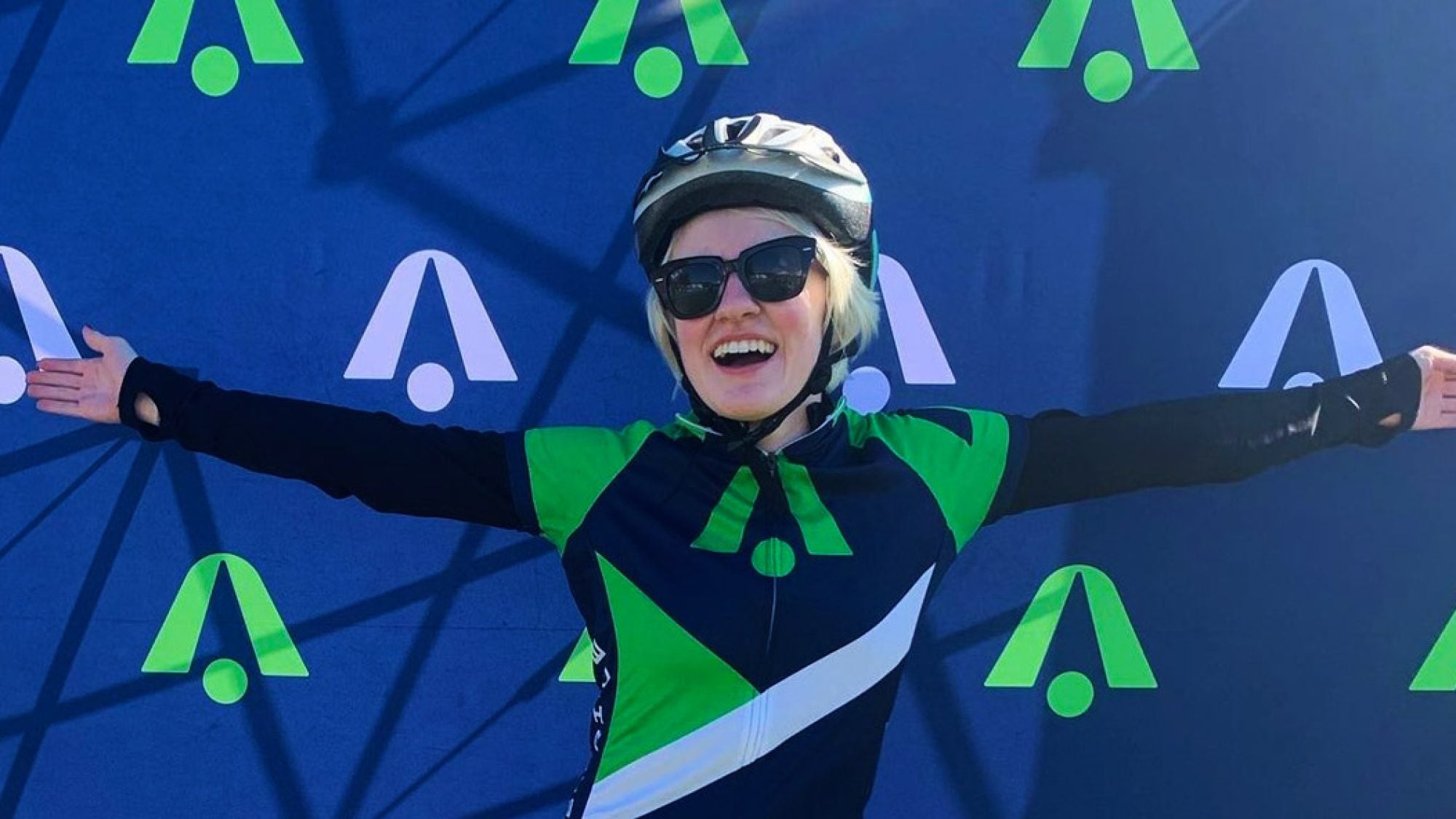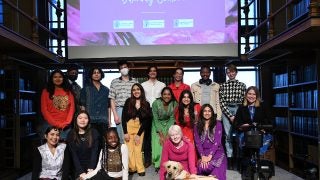When Marissa Nissley (B’24) crossed the finish line during BellRinger Weekend 2022 last fall, she felt a mix of emotions. The 50-mile morning ride from Georgetown to Urbana, Maryland, had been exhausting, but represented an enormous personal triumph.
Nissley is legally blind, and before BellRinger, an annual cycling fundraiser for the Georgetown University’s Lombardi Comprehensive Cancer Center, she had never ridden outdoors.
For Nissley, the road to BellRinger was marked by a journey of self-discovery and achievement – one that ultimately led her to the finish line last fall.
A New Perspective During Lockdown
Nissley was diagnosed with albinism and a visual impairment shortly after she was born. Growing up, she faced unique challenges compared to her sighted peers, but was determined to live a full, self-sufficient and independent life. She did not want to rely on others or on any mobility aids.
“I thought that the only way I could prove my value as an individual was to minimize my differences,” she said in a TEDxGeorgetown event. “I steadfastly believed that being independent meant I could never acknowledge my limitations, even to the detriment of my physical and mental health.”
Her mindset began to shift during the COVID-19 pandemic. In 2020, Nissley was a first-year student at Georgetown, but due to remote learning, she was based in her childhood bedroom hundreds of miles away in New Jersey. She had more time on her hands, and wanted to share her story and connect with others who had disabilities.
Nissley decided to launch her own podcast, Legally Blonde & Blind, in which she interviews young people who are blind and talks about her own experiences. As she researched her first episode, she discovered the Social Model of Disability, a model positing that external barriers and societal perceptions disable people, not their impairments or physical limitations.
The research shifted her own perceptions about her blindness and albinism from a source of shame to an integral characteristic of who she is and how she navigates the world.
“The social model helped me realize that my blindness is not a problem or a source of shame,” she said in her TEDxGeorgetown talk. “Instead of regarding my albinism as a genetic mutation or abnormality, I began viewing it as a characteristic, a part of who I am.”
Her podcast launched her newfound confidence and voice, and once she was able to return to Georgetown for in-person classes, this confidence only began to grow.
On the Hilltop, Nissley became involved in the disability community, serving as a board member of the Georgetown Disability Alliance (GDA) and working closely with Amy Kenny, associate director of the Disability Cultural Initiative, to establish the Disability Cultural Center. The center is charged with coordinating and integrating the educational, academic, social and support programming for disabled students, faculty, staff, allies and community members interested in learning more about disability.
Finding Her Groove on the Bike
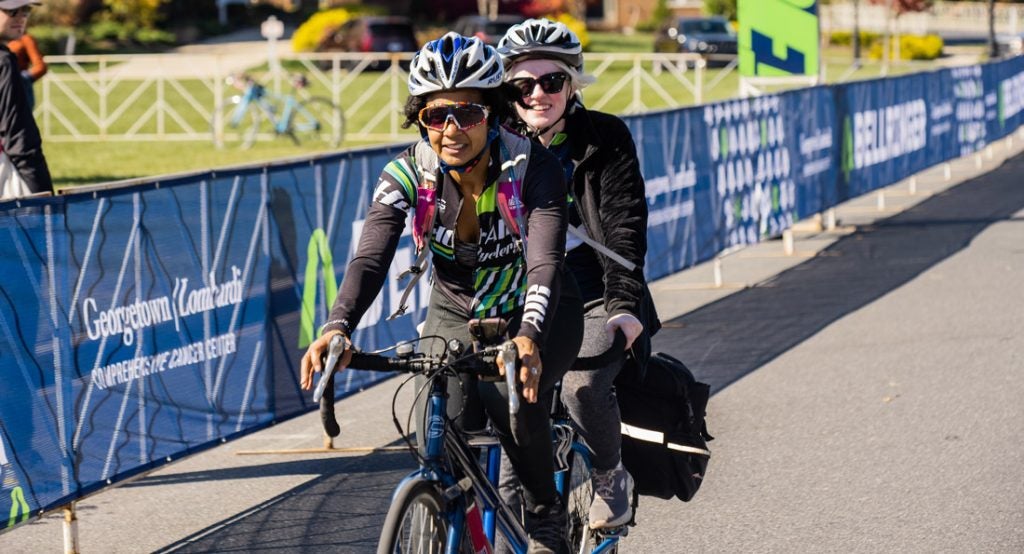
Nissley had always loved bike riding, particularly indoor cycling through SoulCycle. She had never ridden outdoors, however, due to her low vision.
She first heard about the opportunity to participate in BellRinger through her involvement in Hilltop Consultants, a student-run consulting group for nonprofits. She was eager to participate, but knew biking alone wouldn’t be safe or feasible for her.
But Nissley didn’t let her vision deter her from her passion for cycling and working to eliminate cancer. After researching the intricacies of blind athletics, she discovered tandem cycling and quickly realized that there was no reason she couldn’t be a part of BellRinger.
Through conversations with the BellRinger team, Nissley was connected with members of the Metro Washington Association of Blind Athletes (MWABA), and found an experienced captain who could ride lead on a tandem bicycle with her during her first organized bike ride, the 50-mile route in BellRinger’s Inaugural Ride last fall.
Nissley and her captain, Lori Palmer, had never ridden together before BellRinger, and at that point, Nissley had only been on a tandem bike once before.
In the first legs of the race, Nissley found she underestimated the coordination and focus it took to tandem cycle, but within a few short minutes, she found herself in the groove.
Nissley and Lori constantly communicated with each other as they navigated each turn, stop and acceleration. Although they had to talk logistics for a large portion of the ride, they also had the opportunity to get to know more about one another over their five-hour journey. BellRinger was Nissley’s way to not only challenge herself and defy expectations, but to raise awareness for a cause that touches the lives of so many.
Next Ride: 100 Miles
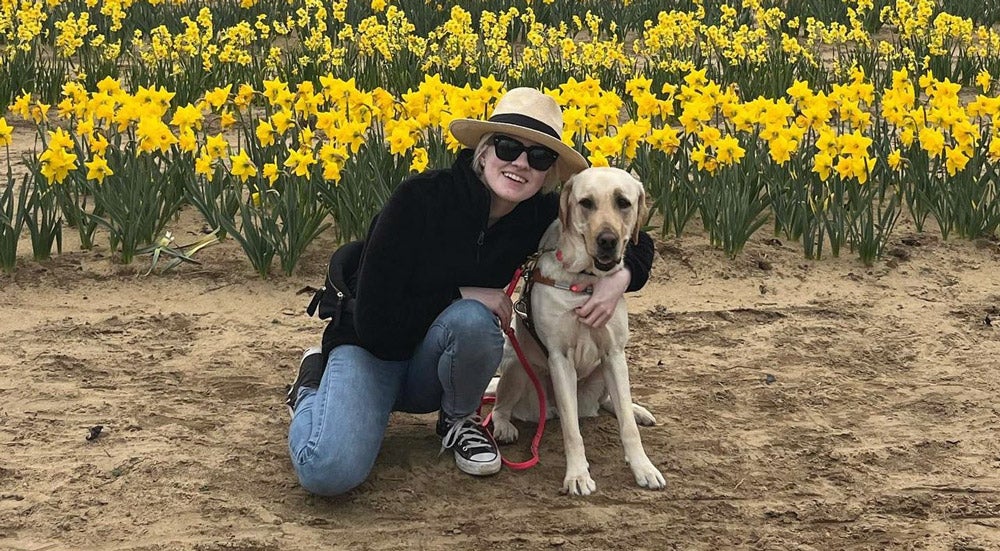
Almost a year later, Nissley is preparing for her next challenge: BellRinger’s 100-mile bike ride in October.
This time, her guide dog, Smalls, will be waiting for her at the finish line — the newest addition to her journey. After stepping foot on Georgetown’s campus for the first time last fall, Nissley realized she wanted to invest in herself to “travel as safely and confidently” as possible, she said. Though she had formerly viewed guide dogs as an indicator of being dependent, through research, conversations and a desire to invest in herself and her well-being, she realized that a guide dog showed her the power of interdependence and freedom.
As she enters her senior year, Nissley said she’s excited for the moment when she crosses the finish line this fall, where Smalls will be waiting to congratulate her after she completes her first 100-mile bike ride.
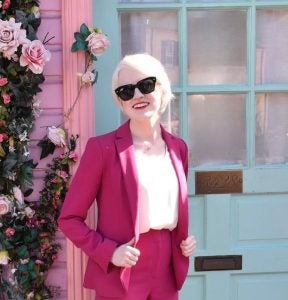
For Nissley, independence had always been etched into the very fabric of her being — a badge of honor she thought she always had to wear, and one she once wore with pride.
But now, through her podcast, the bike race and her guide dog, Smalls, Nissley said she has fully embraced the beauty of being interdependent.
“Working with my guide dog Smalls has made me a better leader, communicator and team player,” Nissley said. “Guide work has made me a stronger cyclist, and I cannot wait for Smalls to lick my sweaty face when I cross the finish line!”
From navigating the intricacies of Georgetown with Smalls by her side to riding 100-miles this fall during BellRinger Weekend 2023, Marissa has proven that society’s perceptions and barriers will never hold her down.
This story was adapted from a post that was originally published on BellRinger’s website.
